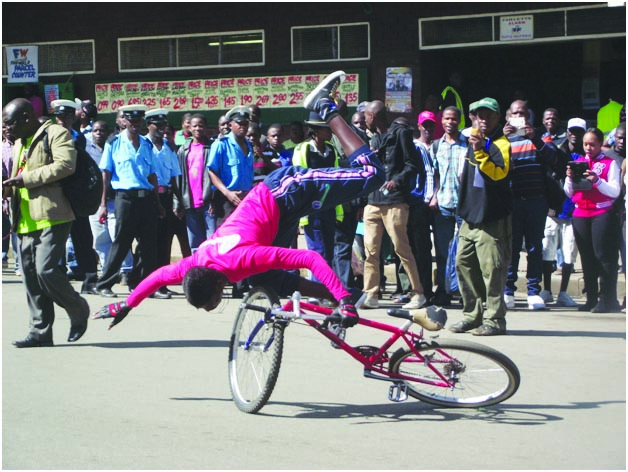


 THE first time short was a bull’s eye. And Harare stood still.And if at all experience is the best teacher, then the next Zimbabwe International Carnival parade would be one event not to miss after the weekend inaugural edition shamed some skeptics. With the potential of the event still huge, Jason Moyo Avenue might end up too narrow for Harare’s carnival. Samora Machel might just solve the problem.
THE first time short was a bull’s eye. And Harare stood still.And if at all experience is the best teacher, then the next Zimbabwe International Carnival parade would be one event not to miss after the weekend inaugural edition shamed some skeptics. With the potential of the event still huge, Jason Moyo Avenue might end up too narrow for Harare’s carnival. Samora Machel might just solve the problem.
Although figures could not be verified, the Zimbabwe Tourism Authority (ZTA) chief executive, Karikoga Kaseke, hazarded a guess that close to half a million people watched the carnival that comprised some nearly 5 000 participants.
As the hundreds upon hundreds of jovial carnival participants marched through the city centre one thing evidently stood out: That music, dance and entertainment generates unlimited good fun and excellent laugh, potential anaesthetics that could effectively sedate the nerves of a nation currently torn apart by relentless socio-economic and political strife.
Seventeen nations joined Zimbabwe as it launched into the world of carnivals through which the country hopes to leverage its tourism industry revival.
Zimbabwe hopes to copy the masters of carnivals, Brazil, which last year alone is said to have raised US$3 billion in revenue from visitors. Rio de Janeiro, Brazil’s second largest city, every year hosts the world’s biggest carnival and in 2011 alone the event drew 4,9 million people, 400 000 of them being foreigners.
However, as the country works towards perfecting its own carnival act it has to immediately go back to the drawing board and start planning for next year’s event. A team or most effectively a company has to be set up, whether as a commercial entity under ZTA or whatever form it takes to run this event professionally.
Once run as a business it will mean that nothing would be left to chance and this will ensure better coordination and organisation because a review of the inaugural event exposes numerous flaws that could have easily been avoided if, for example, the organisers had taken advantage of the technology that the digital age now offers. One of the organisers, after standing, running, talking for more than 12 hours on the day of the carnival parade confided: “My brother I feel like someone who has walked around the world in one day.” Why the torture when in this 21st Century communication is at the tip of our fingers?
A standalone company, just like the Zimbabwe International Trade Fair or the Zimbabwe Agricultural Society, would make life easier and the company would be able to plan in such a way that the carnival is also not politicised to the extent that the essence of the occasion, which is to have uninterrupted fun, is usurped by politicians seeking some mileage. A good one hour of fun was siphoned away by politicians during this year’s event. Politics is too serious a business to have a time slot on this day. It spoils and limits the fun.
Whether well choreographed or senseless, the fun must simply be uncontrollably limitless during the Carnival or Carnivale which, according to the web-based Wikipedia, is a festive time which traditionally occurs in February immediately before Lent, a Roman Catholics’ period of fasting. “The Carnival typically involves a public celebrations or and parade combining some elements of a circus, mask and public street party,” writes Wikipedia which adds that in Brazil huge orgarnised parades are held across the country mainly led by samba schools.
So the suggested company has a lot of things to do and plan between now and the next event. For example, watching the event for the public was a nightmare. Only the tall, those in front positions on the street and those in high rise buildings enjoyed the most. Many motorists were also left confused and lost after all the city’s major arteries were blocked to traffic, meaning that the event’s publicity should have gone so viral that every Tom, Dick and Harriet should have known about it. Time slots for performing groups were so erratic that some groups were denied the chance to excel.
And lastly, while the Carnival has been traditionally observed in February Zimbabwe can adopt its own fixed date or dates for the Carnival. May 25 (Africa Day), on which this year’s carnival was held, might not be the most appropriate because the celebrations deserve a separate day which is now Brazil’s most famous holiday and “has become an event of huge proportion”, according to again Wikipedia.
“Except the industries, malls and the carnival-related workers, the country stops completely for almost a week and festivities are intense, day and night, mainly in coastal cities,” says Wikipedia.